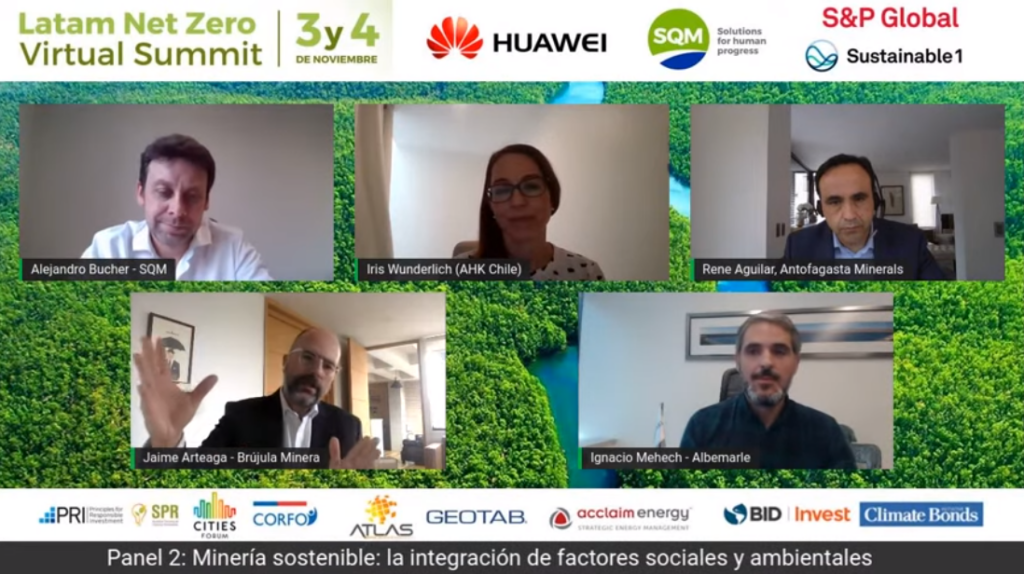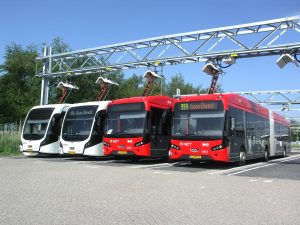On November 3rd and 4th, the Latam Green and Invest in Latam team organized a unique space for debate in the region: the Latam Net Zero Virtual Summit 2021. This free online meeting brought together key representatives from the main economic sectors in Latin America, who discussed the progress, prospects and projections of the transition.
On the second day of the meeting, the discussions focused on how companies and organizations can work together to find long-term solutions for decarbonization.
Today, in order to summarize what happened during part of the meeting, we take a look at Panel 2, entitled “Sustainable Mining: Integrating Social and Environmental Factors”, which brought together key representatives from the regional mining sector, one of the most important for Latin American nations.
You may also be interested in: Chile’s National Assets Awarded the Largest Tender in the Last Decade for Hybrid Projects
Recognizing Sustainable Commitment
Jaime Arteaga, from Jaime Arteaga y Asociados, as moderator, opened the discussion by asking about the necessary processes for society to recognize the sustainable transition measures taken by the mining industry. Iris Wunderlich, Project Leader Mining & Sustainability for AHK Chile, presented her vision of how regional mining can be perceived by European, particularly German buyers.
Wunderlich said that nowadays it is difficult to understand a mining process without considering sustainability measures.
Likewise, Rene Aguilar, vice-president Sustainability at Antofagasta Minerals, pointed out that implementing mining sustainability is a twofold challenge. On one side, mining is required to reduce its environmental impact and, in some cases, its work rate. At the same time, however, mining Lithium and other metals is a key to the energy transition, as these are part of the advanced development of electromobility.
Implementing a Sustainable Mining Agenda
Arteaga introduced to the conversation the second key aspect for sustainable transition, consisting in the process of adopting a transition agenda, which can be done from many angles.
Ignacio Mehech, Vice President of External Affairs and Country Manager Chile for Albemarle, explained that his organization has started from the need to manage this type of work, but considering firstly the impact of its operations. In this sense, for them it is as important to consider what they produce as the method in which they generate it. For this reason, he added, Albermarle has begun to work closely with the communities inhabiting the nearby territories where they carry out their activities.
After what Mehech said, Jaime Arteaga took the opportunity to ask about what can be expected for the future in the sustainable mining sector, to which Alejandro Bucher, Vice President of Technology and Environment Potassium Lithium at SQM, talked about the work of his organization, the second largest Lithium producer in the world.
On the future role, Bucher explained that the most important thing is that companies are increasingly a part of society, and do not act independently of what the latter demands.
“The way forward is to become part of it and understand that sustainability today is not something that has to be complied with, it is not a regulation and even less a marketing issue. It is a part of the company’s values”.
Alejandro Bucher, Vice President of Technology and Environment Potassium Lithium at SQM.
In order to complement this, Jaime Arteaga introduced the results of the Brújula Minera research, which highlighted the role of mining in Chile, where people consider it as a positive sector for their country.
Possibilities and Realities of Sustainable Mining
To close the panel, Arteaga pointed out that it is still difficult for people and States to recognize the sustainable effort of mining companies, thus creating the need to build large impacts that can be recognized by all.
“Indeed,” answered Alejandro Bucher, “the establishment of sustainable mining is difficult to implement and, in some cases, difficult to apply; however, it is necessary to create sustainable mechanisms in order for our impact to be lessened.”
To this statement, Ignacio Mehech, representative of Albemarle, assured that the only possible mechanism is turning to transparency and making the mining business as clear as possible, always respecting sustainable standards.
Finally, Rene Aguilar, Vice-President of Sustainability at Antofagasta Minerals, added that in the future, Chile should not only be considered the mining leader in the region, but also the sustainability leader in mining.
Iris Wunderlich, for her part, assured that a more integrated relationship of cooperation with society must be created in the future, making it part of the important decision making process for the development of sustainable sectors such as mining.




